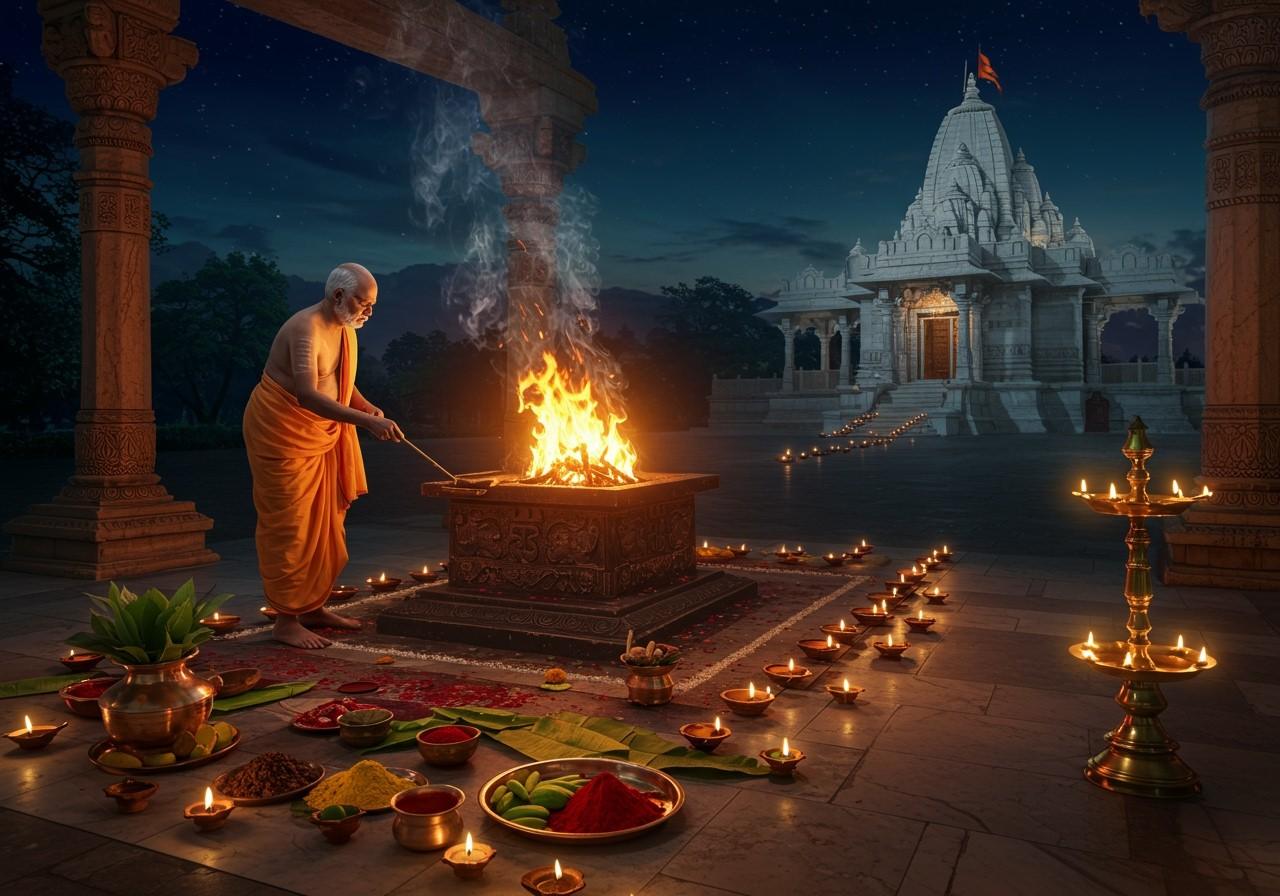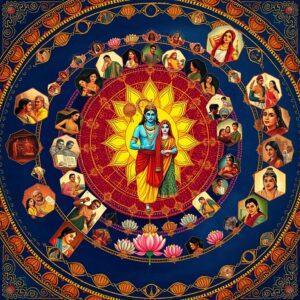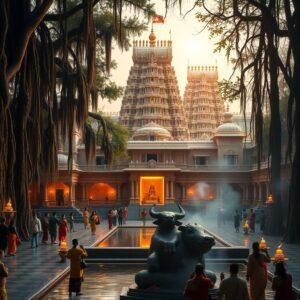
Ancient Indian rituals, with roots dating back to the interaction between indigenous peoples and Aryan migrants around 2000-1500 BCE (leading to the Vedic Period, c. 1500-c. 500 BCE), have profoundly shaped India’s cultural heritage. These practices, once viewed by 19th-century European scholars as static and solely spiritual, are dynamic traditions that continue to resonate in modern India. This exploration delves into their significance, historical context, and enduring influence.
The Significance of Ancestral Reverence
Ancestral reverence, known as ‘Pitru Paksha,’ is a cornerstone of Hindu rituals, originating in the Vedic tradition. During this period, Hindus perform ‘Shradh,’ offering food and prayers to honor deceased ancestors. ‘Tarpan,’ the act of offering water, symbolizes a connection with one’s lineage. The belief in ‘Pitrus,’ ancestral spirits, provides psychological and spiritual comfort, fostering a sense of continuity and identity. The holy city of Gaya holds particular significance for these rituals, believed to liberate ancestral souls.
Ancient Indian Rituals: A Connection to the Past
Numerous ancient rituals remain integral to Indian culture:
- Yajna: A Vedic fire offering central to Hindu worship, symbolizing purification and offering to deities. It’s a complex ritual with specific mantras and offerings.
- Ayurvedic Panchakarma: A traditional healing practice for detoxification and rejuvenation, involving five actions to cleanse the body and restore balance. This ancient practice has gained modern relevance as a holistic wellness approach.
- Navaratri: A nine-night festival dedicated to Goddess Durga, celebrating the triumph of good over evil. It features fasting, devotional rituals, and regional variations in celebrations.
- Kumbh Mela: The world’s largest religious gathering, attracting millions of pilgrims for a holy dip in sacred rivers. It’s a vibrant display of faith and tradition.
- Rangoli: Traditional decorative art using colored powders or flower petals, often created during festivals and auspicious occasions. It symbolizes beauty, prosperity, and welcoming positive energy.
- Havan: A fire ceremony performed for purification and blessings, invoking divine energies. It is often conducted during special occasions and ceremonies.
- Vastu Shastra: Ancient architectural principles emphasizing harmony between buildings and the environment. Its relevance continues in modern construction and design.
- Puja: Daily worship performed in Hindu households, involving offerings, prayers, and rituals. It’s a fundamental practice connecting individuals with the divine.
For those seeking deeper insights into Vastu Shastra, we recommend our blog post: Vastu Shastra: Principles and Practices of Ancient Indian Architecture.
Modern Adaptations of Ancient Rituals
Ancient rituals have evolved to integrate with contemporary lifestyles:
- Digital Platforms: Online puja services and virtual ceremonies make rituals accessible to a wider audience. This allows individuals to connect with their faith regardless of location.
- Eco-Friendly Practices: Environmentally conscious celebrations, such as eco-friendly Ganesh Chaturthi, minimize the ecological impact. This reflects a growing awareness of sustainability within traditional practices.
- Virtual Kumbh Mela: Digital pilgrimages and online experiences offer access to the Kumbh Mela for a global audience. This extends the reach of this significant event beyond physical limitations.
- Ayurveda in Modern Wellness: Ancient Ayurvedic practices are increasingly incorporated into modern wellness routines. This reflects a growing interest in holistic health and traditional healing methods.
- Digital Rangoli: Traditional rangoli designs find expression in digital art and home décor. This adaptation blends tradition with modern artistic mediums.
- Community Yajnas: Reviving Yajna rituals in community events fosters social harmony and connection. This promotes a sense of collective identity and shared tradition.
- Personalized Puja Kits: Online availability of personalized puja kits simplifies ritual preparations. This convenience caters to modern lifestyles while maintaining traditional practices.
Poojn.in: Supporting the Preservation of Ancient Rituals
Poojn.in, India’s leading cultural goods and services store, empowers you to uphold traditional Indian rituals. We offer a wide selection of authentic puja items, delivered conveniently to your doorstep. Discover our comprehensive range:
- Puja Samagri Kits: Complete kits containing all essential items for specific ceremonies, ensuring you have everything you need.
- Copper and Brass Items: Pure copper and brass ritual items crafted by skilled artisans, maintaining traditional craftsmanship.
- Dhoop, Agarbatti, and Havan Samagri: Authentic materials sourced from reliable vendors, guaranteeing quality and purity.
- Puja Thalis and Accessories: Traditional thalis and accessories in various metals and designs, catering to diverse preferences.
- Rudraksha and Sphatik Mala: Genuine malas for spiritual practices, enhancing your connection with the divine.
- Sacred Threads and Religious Clothing: Authentic attire for rituals and ceremonies, upholding traditional customs.
- Pure Cow Ghee and Offerings: Pure and high-quality offerings for rituals, ensuring authenticity and reverence.
Bel Mala and Tulsi Mala are ideal for personal worship and meditation. For those interested in setting up a home shrine, consider Shiva Lingam or Adiyogi Murti.
At poojn.in, we simplify your ritual practice. Our detailed product descriptions, pre-assembled kits, adherence to purity standards, and usage instructions ensure authenticity and proper observance. We offer secure shipping across India, protecting your sacred items. Explore our complete collection at www.poojn.in.
Honoring Traditions in Modern Times
Ancient Indian rituals are not relics of the past; they are living traditions that continue to enrich our lives and connect us to our heritage. From ancestral reverence to daily pujas, these practices embody values and wisdom transmitted through generations. Modern adaptations, such as online platforms and eco-friendly approaches, enable us to integrate these rituals seamlessly into contemporary life. As we embrace these traditions, we honor our ancestors, enrich our present, and ensure the continuity of our cultural heritage.
To learn more about Tulsi Peeth, a significant spiritual center, explore our series of blog posts: Tulsi Peeth: A Complete Guide, Tulsi Peeth Seva Nyas, Tulsi Peeth Legacy, Tulsi Peeth Digital Resources, and Tulsi Peeth Pooja Essentials.


